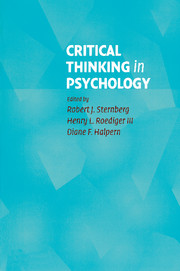Book contents
- Frontmatter
- Contents
- List of Illustrations and Tables
- List of Contributors
- Preface
- 1 The Nature and Nurture of Critical Thinking
- 2 Evaluating Experimental Research
- 3 Critical Thinking in Quasi-Experimentation
- 4 Evaluating Surveys and Questionnaires
- 5 Critical Thinking in Designing and Analyzing Research
- 6 The Case Study Perspective on Psychological Research
- 7 Informal Logical Fallacies
- 8 Designing Studies to Avoid Confounds
- 9 Evaluating Theories
- 10 Not All Experiments Are Created Equal
- 11 Making Claims in Papers and Talks
- 12 Critical Thinking in Clinical Inference
- 13 Evaluating Parapsychological Claims
- 14 Why Would Anyone Do or Believe Such a Thing?
- 15 The Belief Machine
- 16 Critical Thinking and Ethics in Psychology
- 17 Critical Thinking in Psychology
- Author Index
- Subject Index
- References
5 - Critical Thinking in Designing and Analyzing Research
Published online by Cambridge University Press: 05 June 2012
- Frontmatter
- Contents
- List of Illustrations and Tables
- List of Contributors
- Preface
- 1 The Nature and Nurture of Critical Thinking
- 2 Evaluating Experimental Research
- 3 Critical Thinking in Quasi-Experimentation
- 4 Evaluating Surveys and Questionnaires
- 5 Critical Thinking in Designing and Analyzing Research
- 6 The Case Study Perspective on Psychological Research
- 7 Informal Logical Fallacies
- 8 Designing Studies to Avoid Confounds
- 9 Evaluating Theories
- 10 Not All Experiments Are Created Equal
- 11 Making Claims in Papers and Talks
- 12 Critical Thinking in Clinical Inference
- 13 Evaluating Parapsychological Claims
- 14 Why Would Anyone Do or Believe Such a Thing?
- 15 The Belief Machine
- 16 Critical Thinking and Ethics in Psychology
- 17 Critical Thinking in Psychology
- Author Index
- Subject Index
- References
Summary
If you are like most students, you prefer an easy test to a hard test. “Who wouldn't?” you might ask. But if you are a good student, you probably should prefer a hard test to an easy one, for reasons to be discussed. Our intuitions in these matters are not always correct: Sometimes what seems less preferable is actually more preferable, by far.
In this chapter, we consider 21 basic lessons of critical thinking as applied to designing and analyzing research. We do not discuss sophisticated issues, but rather the fairly simple ones that we learn in elementary statistics and design courses, but that nevertheless often trip us up.
MATTERS OF DESIGN
Lesson 1: Make Sure Your Research Question Is Worth Answering in the First Place
We have spent some portion of our careers editing journals. The Number 1 problem we found was not exactly one of design or analysis, but one of whether it was even worth it to design a study in the first place. Always start by asking whether the question is indeed worth asking. Are you really interested in the answer to the question you pose? Would anyone else be? Why? Is the question a big one or a little one? If it is a little one, is it too little to be worth asking?
- Type
- Chapter
- Information
- Critical Thinking in Psychology , pp. 75 - 89Publisher: Cambridge University PressPrint publication year: 2006



